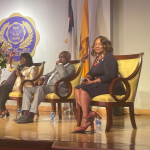By Nicole S. Daniel
The Birmingham Times
Congresswoman Terri Sewell, Alabama State Senator Merika Coleman and Judge U.W. Clemon on Tuesday gathered at Miles College for a discussion that centered on the U.S. Supreme Court’s decision to uphold the protections of the Voting Rights Act of 1965 in the Allen v. Milligan case.
Sewell said she was surprised when the High Court voted 5-4 in favor of Black voters in Alabama, saying the state must draw a new congressional map which is more representative of the state’s population.
“I said, ‘wow.’ I think we all expected the Supreme Court to further gut the Voting Rights Act of 1965. …I am so excited about the historic nature of this victory,” said Sewell. “It ensures that the Voting Rights of 1965 is alive and well, and enforceable. It was an historic victory not only for Alabama but for Black voters and democracy as well.”
Clemons said the decision not only affects Alabama but, it will profoundly affect the nation. “Not because the Supreme Court set a new precedent but rather because of the grace of God in seeing the Supreme Court abided by the precedent that was set in a [previous redistricting case, Thornburg v. Jingles, 1986, from North Carolina] is same God manifested himself a few weeks ago in Allen v. Milligan case.”
Coleman said elected officials do not hold power; the people who elect them do.
If any elected official doesn’t have the voter’s interests at heart “you need to unelected them,” Coleman said. “If I ever forget why I am here, who put me here, and why I am supposed to serve send me home. Hold people accountable,” she said.
To end the panel discussion, a student from Miles College, asked “What is the next step in leveraging the Allen v. Milligan decision made in Alabama?”
“Having this opportunity for our vote to count, knowing that representation matters means that it’s transformational to have fair representation,” Sewell said. “I didn’t say ‘equal.’ I said, ‘fair.’ … The fight is not over yet,” said Sewell.











